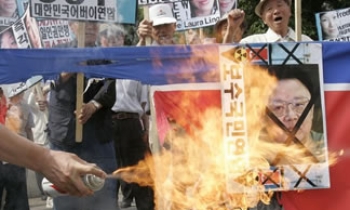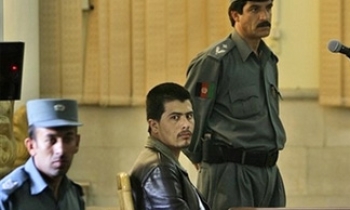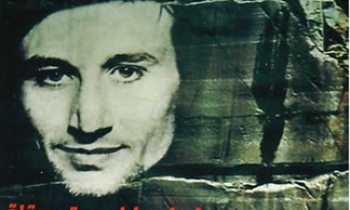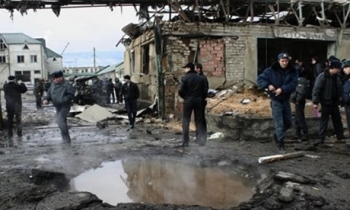(RSF/IFEX) - Reporters Without Borders (RSF) called for an investigation into the apparent links between the paramilitary United Self Defence Forces of Colombia (AUC) and a bodyguard assigned to protect independent journalist Pedro Cárdenas.
Cárdenas has told the press freedom organisation that one of his bodyguards, provided by the Administrative Security Department (DAS), tried to recruit an AUC member to the team accompanying the journalist and threatened to kill Cárdenas when he exposed the attempt.
"We urge the interior minister to seriously consider the threats against Pedro Cárdenas and to investigate the possible link between the DAS and the paramilitaries", RSF said.
"We also call on the authorities to put an end to the impunity still enjoyed by the two individuals who took the journalist hostage in March 2003. The government should look again at the 'Justice and Peace' law which exempted paramilitaries from legal action in exchange for handing in their weapons.
"This law does nothing to prevent former paramilitaries, who have, moreover, been pardoned, from taking action on their own account," RSF added.
It is not the first time that Cárdenas has been the target of death threats in his 17-year career. While based in Mariquita, central Colombia, he was forced to leave the area because of threats from the Revolutionary Armed Forces of Colombia (FARC). After that he settled in Honda, in the western district of Tolima, where he headed a news programme on radio RCN for five years. This broadcast encouraged citizens to phone in with complaints about the running of the local municipality. His vision of journalism, which he considers has a social role, and his frankness won him many listeners in the region.
On 10 March 2003, after he exposed corruption within the Honda municipality on air, the mayor summoned Cárdenas to "buy his silence". The journalist was later visited by a henchman, who said he was a member of AUC and who gave him three orders: to stop speaking about the mayor and his councillors, whether positively or negatively; to stop talking about the company Alcanos, which provides gas to the municipality; and to quit his job at RCN.
Cárdenas refused to resign and on 12 March 2003 he was abducted by two members of the AUC, then released the same day (see IFEX alert of 18 March 2003). Despite the arrest of his kidnappers - inexplicably released before their sentencing, which was due to become known on 3 May 2006 - the journalist left Honda for Bogotá, then went into exile in Uruguay.
On his return from Uruguay, Cárdenas told RSF that he believed he had nothing left to lose and that he had little time left to live. "Either I die with dignity, or I live in the most shameful way, here, in Bogotá," he said. On 18 January 2006, he went back to live in Honda, where he worked as an independent journalist, again exposing local corruption in the bi-monthly magazine "La Verdad".
On 30 January, Cárdenas was visited at his home by Rafael Herrerra Martínez, an alleged paramilitary known as "Rafa", who told him he could no longer stay in Honda and that this first warning would also be his last.
The journalist received a phone call on 25 April from a man who said he was a member of a group of demobilised paramilitaries. The caller told Cárdenas that he would be the target of an attack the following month. He was able to give him details of the equipment to be used in the attack and the names of some of those to take part and of the instigators, apparently paramilitaries.
On 3 May, two men riding on a motorbike, apparently paramilitaries, searched in vain for Cárdenas at all his known haunts. On 8 and 9 May, the journalist found a five thousand peso (approximately 1.6 euros) bill with a bouquet of myrtle, used for funeral wreaths, and a purple ribbon.
After this, the journalist was provided with a bodyguard by the DAS. However one of his bodyguards, Franck Giovanni Ríos, reportedly tried to recruit Fernando René Pimentel, a member of AUC from Puerto Boyacá, for the team accompanying the journalist.
Cárdenas then exposed the incident, providing all the evidence, he told RSF. The bodyguard involved then threatened to kill the journalist if he was dismissed and produced an unsigned statement in the name of Pimentel, denying the charges made by Cárdenas.
The interior ministry protection programme changed the original bodyguards and they were subsequently withdrawn altogether, based on a study carried out by police in Ibagué, western Colombia, in March 2006, which concluded that the journalist was no longer in danger. Cárdenas expressed his astonishment at this decision in a letter sent to the ministry on 12 May.
On 10 May, the journalist received a letter from the ministry, informing him that his complaint had been transferred to the Attorney General's office and that an investigation was being opened.
However, the DAS in the Bogotá region then cast doubt on Cárdenas's statements. It said that the journalist only lodged a complaint after finding out that one of his bodyguards had made a complaint against him accusing him of misusing money intended to buy gasoline for his bodyguards' vehicle. The journalist denied this and said he had copies of the letters that he had sent to the ministry, asking him to change his bodyguards because of his lack of confidence in them. These letters were dated 22 February 2006, while the complaints from the bodyguards were made on 26 February.









